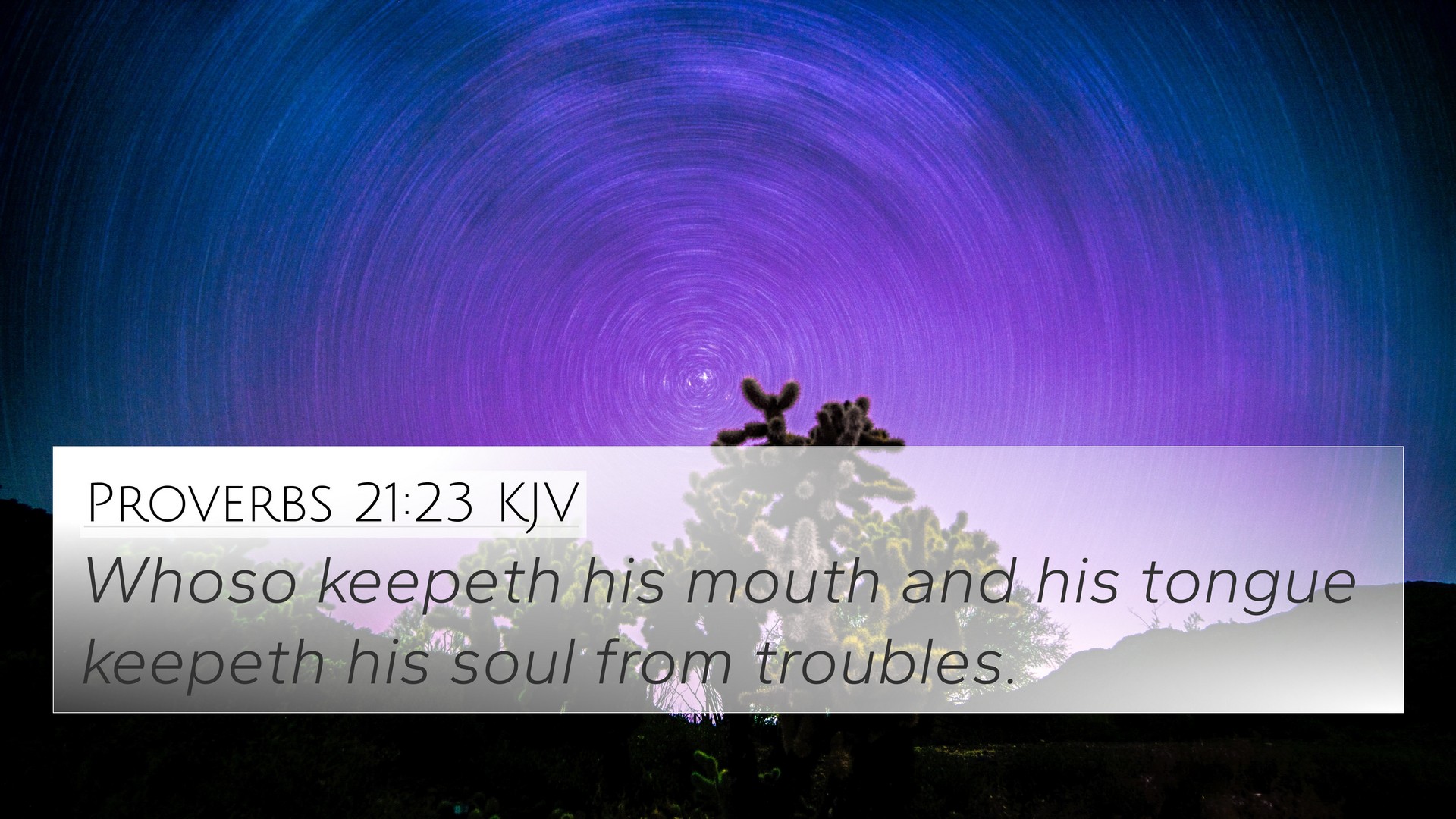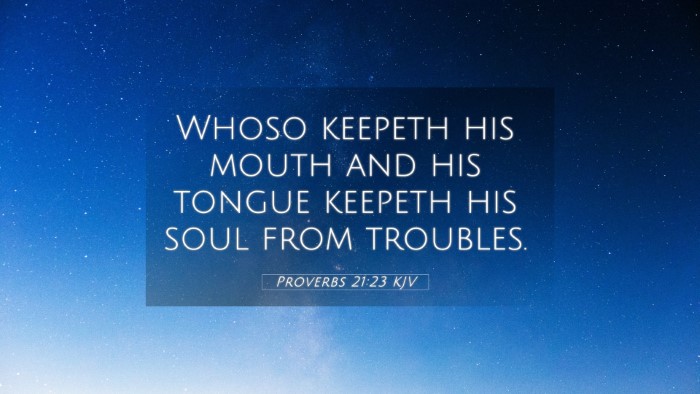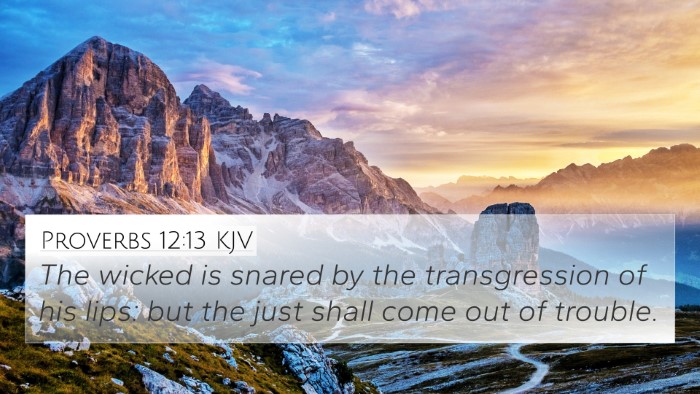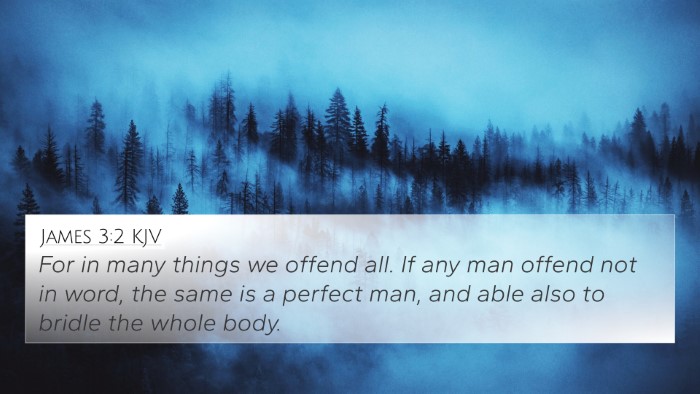Understanding Proverbs 21:23
Bible Verse: Proverbs 21:23 - "Whoever keeps his mouth and his tongue keeps himself out of trouble."
Overview
Proverbs 21:23 emphasizes the importance of self-control, particularly in relation to speech. This verse serves as a reminder of how powerful words can be, and how they can lead to either peace or conflict. Through insights from public domain commentaries, we can appreciate the depths of its meaning and how it connects with other scriptures.
Insights from Commentaries
-
Matthew Henry:
Henry points out that this verse highlights the wisdom in restraining one's speech. He suggests that a person who manages their words wisely is likely to avoid many troubles that arise from careless talk. This concept extends to the notion that silence can be protective and that being slow to speak is a sign of wisdom.
-
Albert Barnes:
Barnes emphasizes the relationship between speech and one's character. He interprets this verse as a warning against the impulsive nature of humans when it comes to speaking. The ability to control one's tongue indicates a level of maturity and self-governance that can safeguard one's integrity and honor.
-
Adam Clarke:
Clarke elaborates further on the consequences of speech. He notes that strife and conflict often stem from careless words, and thus, one who is judicious with their speech will navigate life more smoothly. He suggests that the wisdom of this proverb is applicable in both personal and societal contexts.
Connections Between Bible Verses
This verse can be cross-referenced with several other scriptures that discuss the theme of speech, self-control, and wisdom. Here are some significant connections:
- James 1:19: "Let every person be quick to hear, slow to speak, slow to anger." – This verse echoes the call for carefulness in speech and highlights the importance of listening.
- Proverbs 10:19: "When words are many, transgression is not lacking, but whoever restrains his lips is prudent." – This reinforces the idea that speaking less often leads to fewer mistakes.
- Proverbs 12:18: "There is one whose rash words are like sword thrusts, but the tongue of the wise brings healing." – This shows the contrast between harmful and healing speech.
- Proverbs 15:1: "A soft answer turns away wrath, but a harsh word stirs up anger." – This emphasizes the power of words in diffusing conflict.
- Ecclesiastes 5:2: "Be not rash with your mouth, nor let your heart be hasty to utter a word before God, for God is in heaven and you are on earth. Therefore let your words be few." – A reminder that we should be careful with our speech even before God.
- Proverbs 17:27-28: "Whoever restrains his words has knowledge, and he who has a cool spirit is a man of understanding. Even a fool who keeps silent is considered wise." – These verses reinforce the importance of restraint in speech.
- Colossians 4:6: "Let your speech always be gracious, seasoned with salt, so that you may know how you ought to answer each person." – This encourages thoughtful and kind communication.
Thematic Bible Verse Connections
Exploring the themes in Proverbs 21:23 unveils a broader understanding of biblical wisdom:
- Self-control: The Bible consistently encourages believers to exercise self-control, as noted in Galatians 5:22-23, which lists self-control as a fruit of the Spirit.
- The power of words: This is a recurring theme in Scripture as seen in Proverbs 18:21, which states, "Death and life are in the power of the tongue."
- Wisdom and folly: The contrast between wise and foolish behavior runs throughout Proverbs, reiterating the importance of discernment in both speech and action.
- Conflict resolution: Many verses advise on how to resolve conflicts, such as Matthew 5:9, which says, "Blessed are the peacemakers, for they shall be called sons of God."
Applying Proverbs 21:23 in Daily Life
Understanding this verse calls for practical application in our personal and communal lives. Some ways to apply this insight include:
- Practice active listening: Engage more in listening than speaking to cultivate wisdom.
- Think before you speak: Assess the potential impact of your words on others.
- Avoid gossip and negative speech: Choose to speak positively and constructively about others.
- Reflect on your conversations: After discussions, analyze how your words affected the interaction.
Conclusion
Proverbs 21:23 serves not only as a guide for personal conduct but also enriches our understanding through its connections with many other scriptures. By engaging with this verse and the parallels found throughout the Bible, believers can cultivate wisdom, avoid trouble, and foster a more peaceful existence. Understanding and utilizing biblical cross-referencing provides a fuller picture and aids in deepening one's spiritual insight.









